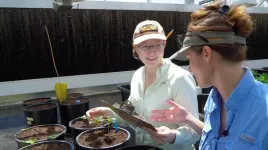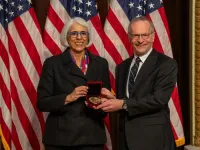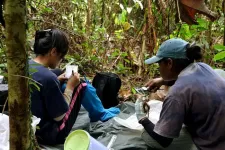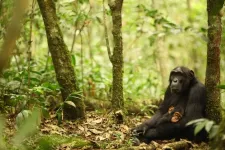Renewed grant will continue UTIA’s integrated pest management program
Funding provides public resources for pest control and pollinator health
2025-01-09
(Press-News.org)
The University of Tennessee Institute of Agriculture (UTIA) has received a $210,000 grant from USDA’s National Institute of Food and Agriculture (NIFA) to support ongoing integrated pest management (IPM) programs across Tennessee.
An environmentally sensitive approach to pest management that emphasizes affordability and long-term sustainability, IPM practices have been implemented statewide courtesy of UT Extension specialists in fields such as agronomy, weed management, entomology, plant pathology, soil health and pesticide education. The recently renewed USDA NIFA grant will support three priority areas within the Extension Implementation Program (EIP), including implementation in agronomic and specialty crops, pest control within houses and schools and improving pollinator health.
Ongoing IPM programs include the following:
Developing online resources
Training agricultural county Extension agents, farmers, consultants, beekeepers and other stakeholders
Monitoring and managing invasive and pesticide-resistant pests
Researching management strategies and their effects on crop sustainability
Educating private and commercial pesticide applicators
Training IPM decision makers in public or low-income housing facilities and in schools
“Since first implemented, we have fostered widespread adoption of IPM practices across the state,” says Heather Kelly, UTIA’s IPM program lead, Extension specialist and plant pathologist. “Thousands of agricultural producers, stakeholders and industry representatives have received the latest research-based information through our in-person events, on-site consultations and free online resources. In the last grant period, our urban IPM team also worked year-round to assist with pest control in 59 apartment buildings, 62 schools and other high-population areas, further improving quality of life for countless Tennesseans.”
USDA NIFA has recently invested another $20 million in Crop Protection and Pest Management (CPPM) grants. The Tennessee funding is among 53 Extension Implementation awards addressing high-priority issues related to pest management using IPM approaches at the state, regional and national levels.
UTIA’s IPM program is made possible thanks to the collaboration of nine UT Extension specialists including plant pathologists Heather Kelly and Jensen Hayter, entomologists Sebe Brown and Karen Vail and apiculturist Jennifer Tsuruda, all from the UT Department of Entomology and Plant Pathology. Also working on the project are agronomists Tyson Raper and Jake McNeal and weed scientist Larry Steckel from the UT Department of Plant Sciences, in addition to soil scientist Nutifafa Adotey from the UT Department of Biosystems Engineering and Soil Science.
The University of Tennessee Institute of Agriculture is comprised of the Herbert College of Agriculture, UT College of Veterinary Medicine, UT AgResearch and UT Extension. Through its land-grant mission of teaching, research and outreach, the Institute touches lives and provides Real. Life. Solutions. to Tennesseans and beyond. utia.tennessee.edu.
END
[Attachments] See images for this press release:

ELSE PRESS RELEASES FROM THIS DATE:
2025-01-09
Key takeaways
Both intuition and past research suggest that whether people deem someone trustworthy depends on that person’s past behavior and reputation for betrayal.
In a series of experiments, psychologists found that subjects regarded those who previously exhibited that behavior as less trustworthy. However, when the betrayal benefited them or had no effect on them, participants regarded the betrayer as trustworthy.
This pattern was largely consistent across the types of relationships studied: friendships, romantic relationships and professional relationships.
Imagine this scenario: Two people cheat on their partners with each other ...
2025-01-09
UNIVERSITY PARK, Pa. — Antibiotic-resistant Salmonella is a serious public health concern that has increased in recent years as the bacteria have developed ways to survive drugs. According to the U.S. Centers for Disease Control and Prevention, people can get Salmonella from eating contaminated food products or from infected people or animals — typically via unintentional contact with feces via touching hands or stroking a pet. However, a team of Penn State researchers have found that household dogs are an overlooked transmission point for zoonotic pathogens such as nontyphoidal Salmonella, which can cause diarrhea, fever and abdominal cramps, with some ...
2025-01-09
For decades, catalysts have been unsung heroes in daily life. These workhorses transform a starting material into a product or fuel with lower energy, like the yeast in bread making and human-made catalysts for converting raw materials into fuels more efficiently and sustainably. A promising class of these helpful substances, called single atom catalysts, has emerged, and researchers need new methods to better understand them. More specifically, they want to know how the structure of the sites where chemical reactions occur, called active sites, affects the catalyst’s ability to speed up the chemical reaction rate, known as the activity.
In an important step forward, researchers ...
2025-01-09
CHAMPAIGN, Ill. — While physical neglect is understudied compared to physical, sexual or emotional abuse, neglect is just as damaging to children’s social development, a new study indicates.
More than 9,150 individuals, nearly 41% of whom retrospectively reported some form of maltreatment before age 12 or reaching the sixth grade, were included in the study, published in the journal Child Abuse and Neglect. The project explored the impact of abuse or neglect on three dimensions of children’s structural peer relationships — whether maltreated youth were less social/more withdrawn, less popular with or avoided by their peers and how ...
2025-01-09
UNIVERSITY PARK, Pa. — Richard Alley, Evan Pugh University Professor of Geosciences at Penn State, was awarded the National Medal of Science at a White House ceremony on Jan. 3.
Alley was one of 23 individuals and two organizations awarded the 2025 National Medals of Science and National Medals of Technology and Innovation, the nation’s highest honors for achievement and leadership in science and technology.
“Dr. Alley is deeply deserving of this most prestigious honor, and it is heartening to know that our nation sees in him what the Penn State community has known for decades,” said Penn State President Neeli Bendapudi. “Dr. ...
2025-01-09
Yang Zhang, PhD, and Jinjun Shi, PhD, both of the Center for Nanomedicine and Department of Anesthesiology, Perioperative and Pain Medicine at Brigham and Women’s Hospital, are co-senior authors of a paper published in ACS Nanoscience Au, “Lipid Nanoparticle Delivery of mRNA and siRNA for Concurrent Restoration of Tumor Suppressor and Inhibition of Tumorigenic Driver in Prostate Cancer.”
How would you summarize your study for a lay audience?
Most cancers occur when there is an imbalance of cellular growth and inhibition, causing cells to grow rapidly and form tumors in the body. For example, ...
2025-01-09
A research team led by the University of Oxford has carried out the most comprehensive assessment to date of how logging and conversion to oil palm plantations affect tropical forest ecosystems. The results demonstrate that logging and conversion have significantly different and cumulative environmental impacts. The results have been published today (10 January) in Science.
Understanding how different aspects of tropical forests are affected by logging and conversion to oil palm plantations is important for identifying priority habitats for conservation and restoration. It can also help aid decisions on land use – for instance, whether a logged forest should be ...
2025-01-09
Chimpanzees bear genetic adaptations that help them thrive in their different forest and savannah habitats, some of which may protect against malaria, according to a study by an international team led by UCL researchers.
Chimpanzees are our closest living relatives, sharing over 98% of their DNA with humans, and the scientists say that their findings, published in Science, can not only teach us about our own evolutionary history, but also about the biology of malaria infection in humans.
Chimpanzees are endangered ...
2025-01-09
Replacing conventional building materials with materials modified to store carbon dioxide could move the planet closer to net-zero greenhouse gas emissions, according to a new study by Elisabeth Van Roijen and colleagues. The researchers calculate that full replacement of conventional building materials with these CO2-sequestering alternatives could store as much as 16.6 ± 2.8 gigatons of CO2 each year – an equivalent to about 50% of the anthropogenic CO2 emissions in 2021. Removing carbon dioxide from the atmosphere, along with decreasing emissions, is important for slowing ...
2025-01-09
In this Policy Forum, John Bistline and colleagues analyze the potential impacts of the U.S. Environmental Protection Agency’s finalized power plant rules regarding greenhouse gas emissions. Using nine models of the U.S. electric sector and energy systems, the researchers found that the rules would speed up the reduction of emissions in the power sector. Under the rules, the levels of carbon dioxide emitted by the sector would be 61%-81% below 2005 levels by 2040. Under current policies, emission levels would be 51% to 83% below 2005 levels by 2040, ...
LAST 30 PRESS RELEASES:
[Press-News.org] Renewed grant will continue UTIA’s integrated pest management program
Funding provides public resources for pest control and pollinator health





